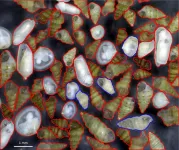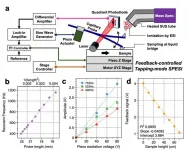(Press-News.org) The coastline of Israel is one of the warmest areas in the Mediterranean Sea. Here, most marine species have been at the limits of their tolerance to high temperatures for a long time - and now they are already beyond those limits. Global warming has led to an increase in sea temperatures beyond those temperatures that Mediterranean species can sustain. Consequently, many of them are going locally extinct.
Paolo Albano's team quantified this local extinction for marine molluscs, an invertebrate group encompassing snails, clams and mussels. They thoroughly surveyed the Israeli coastline and reconstructed the historical species diversity using the accumulations of empty shells on the sea bottom.
Biodiversity loss in the last few decades
The shallow habitats at scuba diving depths are affected most. Here, the researchers were not able to find living individuals of up to 95 per cent of the species whose shells were found in the sediments. The study suggests that most of this loss has occurred recently, presumably in just the last few decades.
Additionally, most of the species still found alive cannot grow enough to reproduce, "a clear sign that the biodiversity collapse will further continue," says Albano. In contrast, the tropical species that enter from the Suez Canal thrive. The warm waters in the Eastern Mediterranean are very suitable habitats for them. Indeed, they occur in large populations and their individuals are fully fit to reproduce.
"For anyone accustomed to snorkel or dive in the Mediterranean," explains the researcher, "the underwater scenario in Israel is unrecognisable: The most common species are missing, while in contrast tropical species are everywhere".
The future perspectives for the Mediterranean are not good. The sea will continue to warm even if we would stop carbon dioxide emissions today. This is due to the inertia of the system, the long braking distance, so to speak.
It is thus likely that the biodiversity collapse will continue to spread. It may already be occurring in other eastern Mediterranean areas not surveyed yet, and it will expand to the West and intensify. Only intertidal organisms, which are to some extent pre-adapted to temperature extremes, and habitats in deeper water, where the temperature is markedly lower, will continue to persist - at least for some time.
"But the future is dim unless we immediately act to reduce our carbon emissions and to protect marine habitats from other pressures which contribute to biodiversity loss," says Paolo Albano, "The changes that already occurred in the warmest areas of the Mediterranean may not be reversible, but we would be able to save large parts of the rest of the basin."
Methodologically, the study was also interesting due to its interdisciplinary character: "These results came from the cooperation of scientists with very different backgrounds," says Martin Zuschin, Head of the Department of Palaeontology and co-author of the study - "In particular, the cooperation between ecologists and palaeontologists is providing unique new views on how humankind is impacting biodiversity".
INFORMATION:
Publication in Proceedings of the Royal Society B: Biological Sciences:
Albano P.G., Steger J., Bošnjak M., Dunne B., Guifarro Z., Turapova E., Hua Q., Kaufman D.S., Rilov G., Zuschin M.: Native biodiversity collapse in the Eastern Mediterranean. Proceedings of the Royal Society B, 2021.
DOI: 10.1098/rspb.2020.2469
Sweden kept preschools, primary and lower secondary schools open during the spring of 2020. So far, little research has been done on the risk of children being seriously affected by COVID-19 when the schools were open. A study from Karolinska Institutet in Sweden has now shown that one child in 130,000 was treated in an intensive care unit on account of COVID-19 during March-June. The study has been published in New England Journal of Medicine.
So far, more than 80 million people have become ill with COVID-19 and globally, almost two million people have died from the disease. Many countries have closed down parts of society in order to reduce the spread of infection. One such measure has been to close schools. ...
Men and women aged over 50 can reap similar relative benefits from resistance training, a new study led by UNSW Sydney shows.
While men are likely to gain more absolute muscle size, the gains relative to body size are on par to women's.
The findings, recently published in END ...
Social media misinformation can negatively influence people's attitudes about vaccine safety and effectiveness, but credible organizations -- such as research universities and health institutions -- can play a pivotal role in debunking myths with simple tags that link to factual information, University of California, Davis, researchers, suggest in a new study.
Researchers found that fact-check tags located immediately below or near a post can generate more positive attitudes toward vaccines than misinformation alone, and perceived source expertise makes a difference.
"In fact, fact-checking labels ...
An international team of researchers led by Swinburne University of Technology has demonstrated the world's fastest and most powerful optical neuromorphic processor for artificial intelligence (AI), which operates faster than 10 trillion operations per second (TeraOPs/s) and is capable of processing ultra-large scale data.
Published in the prestigious journal Nature, this breakthrough represents an enormous leap forward for neural networks and neuromorphic processing in general.
Artificial neural networks, a key form of AI, can 'learn' and perform complex operations with wide applications to computer vision, natural language processing, facial recognition, speech translation, ...
El Niño events have long been perceived as a driver for low rainfall in the winter and spring in Hawai'i, creating a six-month wet-season drought. However, a recent study by researchers in the University of Hawai'i at Mānoa School of Ocean and Earth Science and Technology (SOEST) revealed the connection between Hawai'i winter rainfall and El Niño is not as straightforward as previously thought.
Studies in the past decade suggested that there are at least two types of El Niño: the Eastern Pacific and Central Pacific, when the warmest pool of water is located in the eastern or central portions of the ocean basin, respectively. El Niño events usually ...
WASHINGTON--Black and Hispanic people with COVID-19 and diabetes are more likely than Caucasians to die or have serious complications, according to a new study published in the Endocrine Society's Journal of Clinical Endocrinology & Metabolism. ...
With an estimated lifespan between 25 to 40 years, the queen conch (Strombus gigas) is a prized delicacy long harvested for food and is revered for its beautiful shell. Second only to the spiny lobster, it is one of the most important benthic fisheries in the Caribbean region. Unfortunately, the species faces a challenge of survival: how to endure and thrive, as populations are in a steady state of decline from overfishing, habitat degradation and hurricane damage. In some places, the conch populations have dwindled so low that the remaining conch cannot find breeding partners. This dire situation is urgent in ecological and economic terms.
To preserve this most significant molluscan fishery in the Caribbean, ...
Osaka, Japan - Medical professionals all want to be able to quickly and correctly diagnose diseases. Their future ability to do so will depend on identifying what biochemicals are present in tissue sections, where the biomolecules are, and at what concentrations. For this purpose, mass spectrometry imaging--which can identify multiple biochemicals in a single experiment--will be useful. However, the stability of biomolecular sampling needs improvement to obtain the chemical distribution information with high spatial resolution.
In the recent study published in Analytical Chemistry, researchers from Osaka University used mass spectrometry to image the distribution of ...
A scalpel-free alternative to brain surgery has the potential to benefit people with Parkinson's disease symptoms that are much more severe on one side of the body, new research suggests.
More testing is needed, but the approach, which uses a technology called focused ultrasound, could offer a new option for patients whose symptoms are poorly controlled by medications and those who cannot or do not wish to undergo traditional brain surgery.
"This small brain region, the subthalamic nucleus, had a very strong and potent effect on parkinsonian symptoms when we targeted it with precise, focused ultrasound energy," ...
The invention of optical fibers has revolutionized not only telecommunications but also sensing technology. Optical fiber sensors can measure strain, temperature, pressure, and many other physical parameters along the fibers, but they are currently immune to electromagnetic noise -- interference from other external electric or magnetic interactions. It is a desirable trait, until the effect of the electromagnetic field on the fibers needs to be measured. Now, an international team of researchers has used what was previously considered a 'damaged' part of an optical fiber to develop such a magnetic field sensor.
They published details of their approach on Nov. 5 in Advanced Photonics Research.
"This nature of immunity ...







